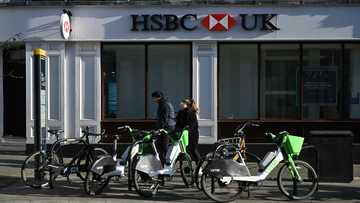Domestic Debt Exchange: Analyst Predicts Big Banks Will Survive Challenges But Small Banks Will Need Help
- The disturbances caused by the DDEP to the financial sector will affect small banks more, a finance expert has warned
- Haruna Alhassan told YEN.com.gh that although local banks will be able to recover after three years, big banks will weather the storm much better
- He has advised small local banks to begin getting help early so the impact of the DDEP does not bury them
PAY ATTENTION: Enjoy reading our stories? Join YEN.com.gh's Telegram channel for more!
A finance expert has said the problems that have been triggered in Ghana's financial market by the domestic debt exchange programme won't severely affect big banks in the country.
Haruna Alhassan, affiliated with the influential Ghanaian think tank Centre for Social Justice (CSJ), has said small local banks in Ghana would record the biggest losses as the effects of the debt exchange programme kick in.
As predicted by some analysts in the past, government's controversial debt restructuring drive caused top banks in Ghana to record significant losses in 2022.

Source: Getty Images
The 2022 performance of banks as contained in the financial statements shows top banks like Standard Chartered Bank and GCB Bank bled money in the year under review.
PAY ATTENTION: Follow us on Instagram - get the most important news directly in your favourite app!
GCB Bank's audited accounts show the bank recorded a GH¢593.4 million net loss for the year ending December 2022, a first since 1993.
But speaking to YEN.com.gh in an exclusive interview, the finance expert at CSJ said well-capitalised banks should weather the storm a little more faster than small local banks.
"Per the results released, about three or four banks now have capital the minimum GH¢400 million and will need to recapitalisation within the next three years as per BoG [Bank of Ghana] reliefs. One of such banks actually has a negative capital and will require significant help," Haruna Alhassan said about of the small banks needing help.
He explained that the big banks will be able to withstand losses from the debt exchange and will still be able to meet minimum capital requirements and the capital adequacy ratio targets set by the central bank because they have these two key advantages:
1. Higher reserves arising from undistributed prior year's profits.
"The leading banks made significantly larger profits year after year during the good times," he said.
2. All the big banks, with the exception of GCB, are owned by bigger international banks that can easily send in additional capital to support their Ghana operations if needed.
"Standard Bank, for instance, has gone public with their intention to recapitalise Stanbic Bank Ghana if necessary," he cited.
On the other hand, he said, the smaller banks historically made relatively smaller profits and, therefore, have smaller reserves to contain the DDEP losses and prevent them from falling below minimum capital requirements.
Haruna Alhassan explained to YEN.com.gh that the smaller banks are locally owned and thus have no external parent support to recapitalise.
Losses in the banking sector could have been worse
Meanwhile, renowned Economist Professor Godfred Bokpin has said the losses recorded by Ghana's big banks could have been worse, about 80% upwards, if they had signed up for the original DDEP deal presented by the finance minister, Ken Ofori-Atta.
He said the subsequent reforms by the government made the deal less suffocating.
He told 3News that the pushback by some banks, labour unions and interest groups saved the country's financial system from catastrophe.
How Ghanaian banks lost big in 2022 over DDEP
The 2022 Summary Financial Statements released by the banks disclosed that the losses were due to the reduced coupon rates.
The extension of the maturity period of coupons from five to 15 years was also another major factor.
Consolidated Bank Ghana, a local bank, recorded the biggest loss of about GH¢2 billion in 2022.
Generally, local banks lost the biggest, according to the statement.
A few banks recorded profits despite DDEP 'squeeze'
In an unexpected turn of events, however, some six banks made profits (profits before tax, PBT) in 2022 despite the disturbances caused by the debt exchange.
GT Bank announced a PBT of GH¢191 million, Societe Generale also recorded a PBT of GH¢172 million, while FBN Nigeria recorded GH¢102 million. UBA recorded GH¢91 million PBT.
In all, the summary of the banks' financial statement shows that Ghana lost about GH¢15 billion in 2022 due to the DDEP.
Individual Bondholders worried about uncertainties triggered by DDEP
Meanwhile, YEN.com.gh has reported in a separate story that individual bondholders in the country kicked against their inclusion in the Domestic Debt Exchange programme.
They complained that the uncertainties that they will be plunged into if the government proceeds with the programme in its current form make them anxious.
They thus want their investments to be excluded from the ongoing debt exchange programme.
New feature: Сheck out news that is picked for YOU ➡️ click on “Recommended for you” and enjoy!
Source: YEN.com.gh





